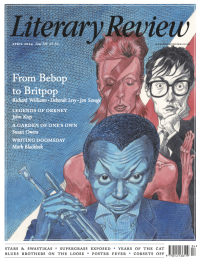Nigel Andrew
Fake It Till You Make It
The Book Forger: The True Story of a Literary Crime That Fooled the World
By Joseph Hone
Chatto & Windus 336pp £22
This book has a great story to tell – the author calls it, without exaggeration, ‘perhaps the most sensational literary scandal of the last hundred years’ – and Joseph Hone narrates it brilliantly. Strictly speaking, it was not quite a ‘literary’ scandal but rather a bibliographical one, as it involved the faking of physical books, not their contents. It was a scandal affecting the most exalted levels of book collecting and the book market, and the man responsible for the faking was one of the most revered authorities and collectors of the first part of the 20th century, Thomas James Wise.
The story of Wise’s most egregious crimes was first told by the two men who uncovered them (further crimes came to light later, revealed by Hone himself, among others). The booksellers John Carter and Graham Pollard published their findings in 1934 in a book with the deceptively bland title An Enquiry into the Nature of Certain Nineteenth Century Pamphlets. It caused an instant sensation, not only shaking the antiquarian book trade and dethroning Wise, but also becoming a news story. It was the result of a long process of painstaking detective work, making use of the latest forensic techniques, notably the chemical analysis of paper. Carter and Pollard’s exposé stuck scrupulously to the facts, and the authors took care to stay out of the courts by never actually stating Wise’s guilt. The evidence they presented was so overwhelming that they didn’t need to.
Hone expertly spins two narrative strands. They start out in parallel but increasingly intertwine, finally coming together in an account of Pollard’s climactic face-to-face confrontation with the cornered Wise. One narrative strand follows Wise from his early days in the various literary societies that thrived in late Victorian times, through

Sign Up to our newsletter
Receive free articles, highlights from the archive, news, details of prizes, and much more.@Lit_Review
Follow Literary Review on Twitter
Twitter Feed
Under its longest-serving editor, Graydon Carter, Vanity Fair was that rare thing – a New York society magazine that published serious journalism.
@PeterPeteryork looks at what Carter got right.
Peter York - Deluxe Editions
Peter York: Deluxe Editions - When the Going Was Good: An Editor’s Adventures During the Last Golden Age of Magazines by Graydon Carter
literaryreview.co.uk
Henry James returned to America in 1904 with three objectives: to see his brother William, to deliver a series of lectures on Balzac, and to gather material for a pair of books about modern America.
Peter Rose follows James out west.
Peter Rose - The Restless Analyst
Peter Rose: The Restless Analyst - Henry James Comes Home: Rediscovering America in the Gilded Age by Peter Brooks...
literaryreview.co.uk
Vladimir Putin served his apprenticeship in the KGB toward the end of the Cold War, a period during which Western societies were infiltrated by so-called 'illegals'.
Piers Brendon examines how the culture of Soviet spycraft shaped his thinking.
Piers Brendon - Tinker, Tailor, Sleeper, Troll
Piers Brendon: Tinker, Tailor, Sleeper, Troll - The Illegals: Russia’s Most Audacious Spies and the Plot to Infiltrate the West by Shaun Walker
literaryreview.co.uk